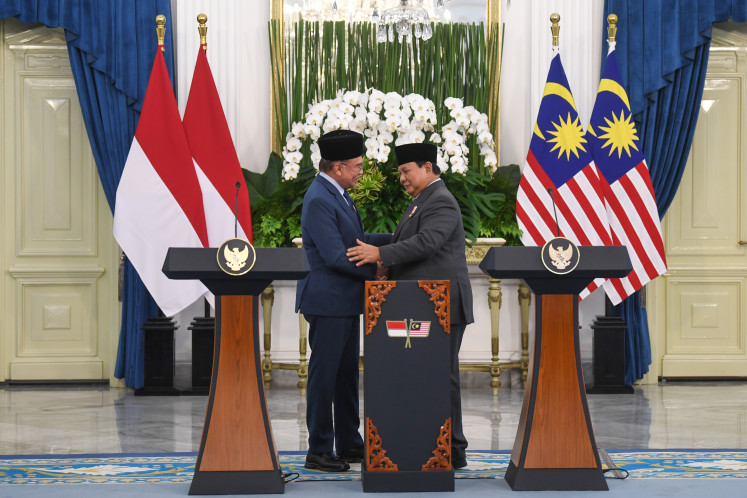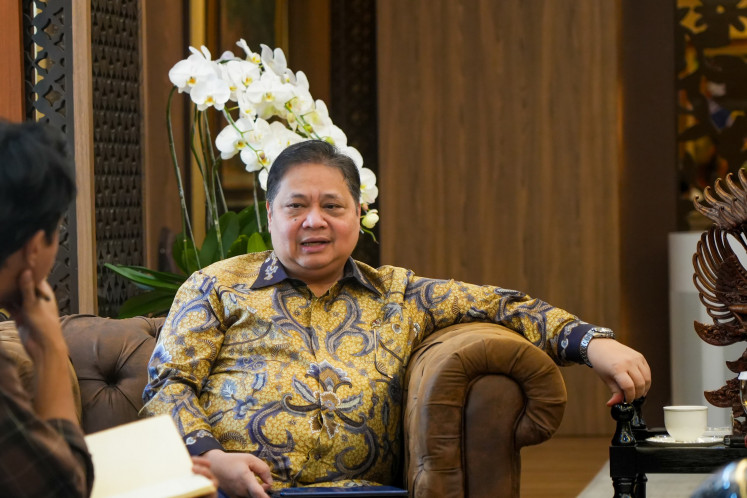Popular Reads
Top Results
Can't find what you're looking for?
View all search resultsPopular Reads
Top Results
Can't find what you're looking for?
View all search resultsTafsir: Crossing the Islamic divide
TAFSIR: (JP/Suherdjoko) More than 20 years ago a student of the Walisongo State Institute of Islamic Study in Semarang got into an argument with his friends about which political party would win the general election
Change text size
Gift Premium Articles
to Anyone
TAFSIR: (JP/Suherdjoko)
More than 20 years ago a student of the Walisongo State Institute of Islamic Study in Semarang got into an argument with his friends about which political party would win the general election.
The young man confidently said the winner would be Golkar or the Indonesian Democratic Party (PDI), which later became known as the Indonesian Democratic Party of Struggle (PDI-P).
"Because they were the only two parties that were not Islam-based," said Tafsir, now 44, recalling his past.
Yet Tafsir said it was two parties who were most deserving of an Islam label. His friends disagreed.
But Tafsir reasoned: "Because Golkar and PDI-P are like Allah, who will accept all groups -- those who are religious, those who believe in mysticism and even atheists. On the other hand, the Islam-based parties are narrow-minded. Because they only care for one group."
Tafsir's predictions proved correct.
With ideas that crossed over the Islamic "fence", Tafsir has built up interfaith communication by mingling with non-Muslims, which makes him somewhat unique among his fellow members of Muhammadiyah, the country's second-largest Muslim organization.
"For me, Islam is a living value which provides for all aspects in life. Islam is not a source of law, but a moral source. Clearly, many oppose my idea," the man who was born in Pejagoan, Kebumen, Central Java, a ceramic tile industry center, said.
Tafsir is a senior in Muhammadiyah as the secretary of the Muhammadiyah Regional Leadership Board in Central Java. He was previously the secretary of the youth board of the organization.
"I often have different ideas from my friends (in Muhammadiyah) who believe in the struggle for sharia (Islamic law). For me, Islam should not necessarily mean sharia. Islam is not a party, and not a state, either. Islam can be applied inclusively and it can blend in different aspects of life," he said.
Tafsir's pluralist ideas led him to win the Maarif Award, which he received on June 3 at Graha Bhakti Budaya of the Ismail Marzuki art center in Jakarta.
The award was from the Maarif Institute for Culture and Humanity, which was established by former chairman of the central executive board of Muhammadiyah, Ahmad Syafii Maarif.
Tafsir said the University Student Union of Muhammadiyah in Central Java nominated him for the award.
"The Maarif Institute receives many nominees. But finally they chose three of us, TGH Hasanain Djunaidi (West Nusa Tenggara), Cicilia Yulianto Handayani (Surabaya ) and me," he said.
The main requirement to receive the Maarif Award is working toward pluralism -- which Tafsir certainly meets.
He is accepted in all circles: He is close to Christian ministers, Buddhist monks, Catholic and Hindu priests and atheists also accept him.
His ideas and actions are against Muhammadiyah's mainstream line. "I know that, and so do my friends. So far there has been no problem. Gradually, I have even had a pluralist influence on the Muhammadiyah circle," he said.
Tafsir, who was active as a patron of the Muhammadiyah Disaster Center, talked about his experiences setting up posts to help flood victims in Pati.
"Four of the five posts were located either in the village hall or in a public figure's house. Only one was established in a building belonging to Muhammadiyah," he said.
He told his members not to be discriminative in helping people, adding they should help everyone, regardless of their religion -- even if they were atheist.
"The point is humanity should not be based on religion. Only the akidah (creed), which should not be *mixed up'," he said.
When he helped earthquake victims in Klaten, the group he led channeled aid from the UNDP. He told local Muslim communities: "This funding might come from people who are rather atheist. And so does the money from Unicef. But Allah owns the whole world, including the fortune and the money.
"It happens that the money is managed by UNDP and Unicef and possibly George Bush. We can ask for the money and it is halal because it belongs to Allah," he said.
As a result, the earthquake victims did not hesitate to receive support from Western countries.
Tafsir and the Interfaith Committee of Semarang are also active in peace-building activities for residents in Kayen, on the city's outskirts. They work together to build the village by involving people from all walks of life and educating them.
"For instance, when the husbands and wives got together, I asked the wives to write down what they thought made a good husband. I also asked the husbands to do the same thing. After we collected the notes, we discussed them, so they knew what they all wanted," he said.
Tafsir is married to Siti Nurhayati and he supports a widow, Mulyanah, 35, whose husband, Jumali, 37, died in January this year. Jumali was shot by a man in a jealous rage who then set his house on fire, in which seven-month-old Rafel Hadiwinata, the youngest of four siblings, perished.
"I help (Mulyanah) with her family's daily needs. She now takes odd jobs to feed her three children," Tafsir said.
"Sometimes she even skips her meals so that her children have enough to eat. I have sent the eldest son to the Muhammadiyah Orphan House."
Tafsir also writes articles, books and conducts research on pluralism. Last year he wrote a book titled Agama: Antara Juru Damai dan Pemicu Konflik (Religion: Between Peacemaker and Conflict Trigger), and an article titled "Paradigma Kasih dalam Islam" (Paradigm of Love in Islam) in Inspirasi, a Catholic magazine.
Tafsir also often takes part in discussions about religious differences with different parties.
While he is fully aware that as a pluralist Muhammadiyah member, he is somewhat unusual, he believes he is on the right track.










